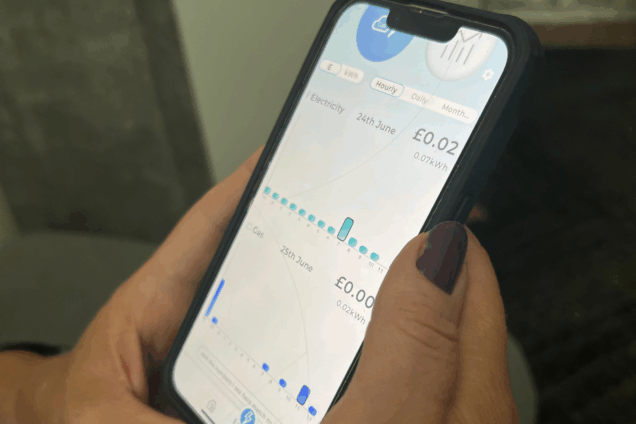Justine is our Decarbonisation Engagement Officer who works alongside our Assets Team and stakeholders in the delivery of our Footprint Programme. Justine ensures that our customers voices are heard at every step of the way on our journey to net zero here at Hafod.
Get in touch
For general energy saving advice please visit the Energy Saving Trust website.
If you are concerned about the performance of your loft insulation, please email asset.management@hafod.org.uk to arrange your free stock condition survey or take a look at this government fact sheet.


Ask Justine
Do you have a question for our Decarbonisation Engagement Officer?
Our Decarbonisation Engagement Officer, Justine, is available to our customers for advice on how to reduce your carbon footprint or questions about our journey at Hafod to net zero.
Have you got a question? If so, ask Justine here.
“That’s a really good question! Pollinators are insects that help plants grow. They include bees, butterflies, flies, wasps, and other flying bugs. These insects move pollen from one flower to another, which helps plants make fruit, seeds, and new flowers. Without pollinators, it would be hard to grow enough food for people and animals.
Sadly, many pollinators are in trouble. Around 40 out of every 100 are disappearing, and 1 in 3 could become extinct.
Why are pollinators disappearing?
The biggest problem is that pollinators are losing their homes. They need places like wildflower meadows, hedgerows, and woodlands to live. But since 1945, the UK has lost 97% of these places. This has happened because of farming, building houses, and using garden sprays like weedkillers and bug sprays. These sprays can kill the plants and insects that pollinators need to survive.
Climate change is also making things worse. It changes the weather and seasons, which makes it harder for pollinators to find food at the right time.
How can we help?
Now that it’s summer and we’re spending more time outside, there are lots of easy ways to help pollinators:
- Don’t mow the lawn too often – this lets flowers like dandelions, clover, and daisies grow, which are great food for pollinators.
- Give them water – a shallow dish with pebbles and water makes a safe place for insects to drink.
- Avoid garden sprays – bug sprays and weedkillers can hurt or kill pollinators. Try natural ways to care for your garden.
- Plant lots of flowers – choose flowers that bloom at different times of the year so pollinators always have food. You don’t need a big garden – pots and containers work too!
Want to know which flowers are best? Have a look at this list.
If you’ve made a garden that helps pollinators, we’d love to see it! Send in your pictures to getinvolved@hafod.org.uk and show how you’re helping these amazing little creatures.
Together, we can protect pollinators and help nature thrive!”
“Every year, people in the UK throw away millions of tonnes of food. But did you know that 70% of this waste comes from our homes? This isn’t just wasting money; it’s also bad for our planet. When we throw away food, it creates harmful gases that go into the air, which is a big cause of climate change.
Why does this happen?
Making food uses lots of resources like land, water, energy, and fuel. When we waste food, all these things get wasted too. Also, when food rots in rubbish dumps, it makes a gas called methane. Methane traps heat in the air much more than carbon dioxide does.
The good news is we can all help stop food waste by making small changes at home. Here are some easy things we can do:
• Plan Your Meals: Only buy what you need and make a shopping list so you don’t buy too much.
• Store Food Properly: Learn how to keep food fresh for longer, like putting bread in the freezer or keeping apples in the fridge.
• Use Leftovers: Be creative with leftovers to make new meals.
• Reduce Portion Sizes: Make smaller portions if you often have too much food left over.
• Think About Shelf Life: Prepare meals with how long the food will last in mind.
If you have any tips on how to reduce food waste, we would love to hear them!”
“Trees do more than just form part of our surroundings, they play an important job in our health, happiness, and well-being. By loving and caring for the trees in our communities, we’re investing in a better future for us, our wildlife and environment.
They play an important role in helping to combat climate change by absorbing carbon dioxide a key greenhouse gas from the atmosphere. They also prevent soil erosion and reduce the risk of flooding.
Trees also improve the air quality around us by absorbing pollutants and releasing oxygen, making our air cleaner and healthier for us to breathe. They also provide shade and reduce heat, making our streets and homes cooler and more comfortable places to live, especially during the hot summer months.
Trees also support local wildlife, providing food and shelter for birds, insects and other creatures, which helps maintain biodiversity within our built-up areas.
In addition to these environmental benefits, studies have shown that spending time around trees can help reduce stress, anxiety and improve your mood. Just a short walk in a green open space or even viewing trees from a window can have a positive impact on our mental health.
Lastly, trees make the places we live more pleasant and attractive.
For all these reasons, this is why trees are so important within our communities as they are vital to our environment, our health and happiness.”
“Thank you for asking this very important question. As this is a newly created role, I think it’s important to explain what the term ‘Decarbonisation’ means. This term is associated with the fight against climate change and refers to the way in which greenhouse gas emissions, such as CO2 are reduced. Putting it very simply, it all about ‘carbon reduction’.
Hafod currently have a project across three of our sites, where we are reducing our carbon output by making our homes more energy efficient and we are also installing renewable energy sources there such as solar panels.
So, this is where my role comes in. It’s my job to ensure that the customers on these three sites are with us at every step of the way on this carbon reduction journey and that their voices are heard.
I will try to ensure that everyone is happy, updated with progress and understand why the works are being undertaken. I also hope to highlight what benefits it will bring. These benefits will provide improved living conditions, reduce energy consumption, and help to save our planet.
You have also mentioned that Hafod often use words that tenants don’t understand. It’s unfortunate that the industry sector that deals with energy efficiency related works and speak about climate related matters is very often heavily jargon related.
Again, it is my role to ensure that all Hafod customers understand our priorities in this area and I will try my best to ensure that any language used to describe what we are doing is simple and easy to understand. I have put together a glossary of key terms that you may find useful.
In addition to assisting with the energy efficient carbon reduction project, I am also looking at ways to work within our communities to ensure that our green open spaces are as wildlife friendly as possible.”
If you have any questions about ventilation or notice any signs of damp or mould, please don’t hesitate to contact us. We’re here to help you keep your home in top condition.”
